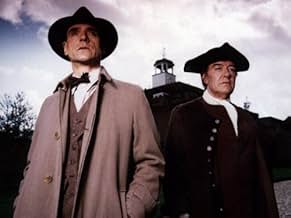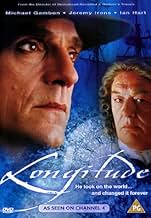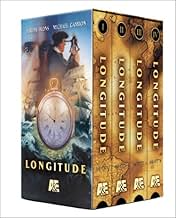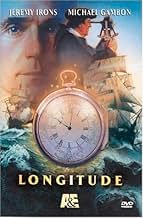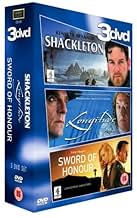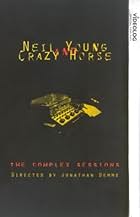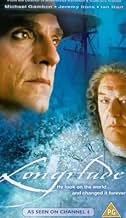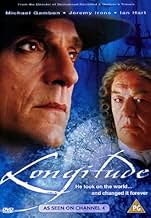Longitude
- Miniserie de TV
- 2000
- 1h 39min
En dos historias paralelas, el relojero John Harrison construye el cronómetro marino para la navegación segura en el mar en el siglo XVIII y el horólogo Rupert Gould se obsesiona con restaur... Leer todoEn dos historias paralelas, el relojero John Harrison construye el cronómetro marino para la navegación segura en el mar en el siglo XVIII y el horólogo Rupert Gould se obsesiona con restaurarlo en el siglo XX.En dos historias paralelas, el relojero John Harrison construye el cronómetro marino para la navegación segura en el mar en el siglo XVIII y el horólogo Rupert Gould se obsesiona con restaurarlo en el siglo XX.
- Ganó 5premios BAFTA
- 7 premios ganados y 5 nominaciones en total
Opiniones destacadas
Logitude is another in a long line of excellent British films that have not received the viewership they deserve. I watched this film on Channel 4 shortly after the new year. And I admit, all the hype over this film in the previous weeks was justified. Accute performances on Gambon's John Harrison as well as Iron's part, of whom mind I must admit I am no fan, plus the usual assortment of marvelous west end stage performers in particular John Wood as Edmund Halley proclaim Longitude as excellent entertainment.
The story was, on the other hand somewhat mellowed down and excessively lengthed. Yet I suppose in order to transpire the scientific details presented in the novel, length was required. But overall it is a great recount of history and I strongly recommend it to American audiences who won't find this sort of thing at home easily.
The performances of the two principals, Michael Gambon and Jeremy Irons were awe inspiring, the excellent supporting cast did not let them down.
What on the surface sounds like a dry story - the search for a means of accurately determining longitude at sea - and the obsession many years later of a returned WW1 soldier with locating and restoring the devices invented for that purpose - was turned into a genuine cliffhanger by the producers. Initially I found the switching from one story to another somewhat disconcerting, but it was done so well that it soon felt quite comfortable.
This is the story of one man's lifelong trial and error search to perfect his devices and to win the prize offered for the solution to the longitude problem. Against all odds and at great damage to his health he and his son eventually succeeded. Interspersed with this is the story of another man centuries later who was determined to locate & restore the devices and to ensure their preservation for future generations.
I can really recommend this show to anyone with an enquiring mind, who enjoys a fascinating story, excellently told.
As a side note, Sir Isaac Newton (1642--1727) was in the same era as in the time setting of the story. I wonder if Sir Isaac Newton had ever involved with this 'board of longitude' ;)
In the days when ships measured themselves by yardage of sail and bank of cannon, knowing your north-south latitude was easy. Finding your east-west longitude however (and keeping your ship off the reefs) was hit-and-miss. That could get you killed. The cure was to know the time in London, precisely, but keeping time accurate on a rolling ship was tougher than keeping milk fresh; pendulum clocks need stable ground, and pendulum clocks were all they had.
Queen Anne (Br., 1665-1714) had another idea: a 20,000 pound-sterling prize to anyone who had a solution. Problem was, no one expected a country carpenter cum-clockmaker to do it. John Harrison (Michael Gambon) was that carpenter, and it became *his* problem--a three-decades-long problem. It would also pose one for Rupert Gould (Jeremy Irons) two centuries later, as a marriage-busting, sanity-breaking obsession over restoring Harrison's neglected prototypes: clocks that could keep time at sea better than the quartz-timed digital you might be wearing now.
"Longitude" weaves seamlessly--almost--between the two eras, tracking the exertions and miseries of John Harrison and Rupert Gould with the same kind of synchronicity Harrison spent half his life pitching to astronomers who had scarce respect for the tinkerings of a hayseed. Michael Gambon's passionate performance as John Harrison is truly Oscar-calibre, eclipsing Irons--but only because the tunnel-visioned Rupert Gould is hardly a vehicle for the memorable. Too bad this was "only" a TV mini-series. As a theatrical release it would have lent due reknown to a scarce-remembered true epic of genius.
Watch this when you get the chance. Then go punch Tom Green in the nose.
"Longitude" is filled with tons of edge-of-your-seat, gritty scenes, and every second of the 200-minute film glows with a profound message. The ending scene is especially powerful, in which Rupert Gould remarks, "What makes a man great? A man may be great in his aims, or in his achievements, or in both...but I think that man is truly great who makes the world his debtor..who does something for the world which the world needs, and which nobody before him has done or known how to do."
Definitely a great educational film to watch, and an excellent film to own. "Longitude" is an unforgettable experience and a demonstration of just how good a movie can be.
¿Sabías que…?
- TriviaTo portray the aftermath of the shipwreck in the Isles of Scilly, dozens of extras had to lie in the cold surf, pretending to be dead, for over an hour.
- ErroresDuring the entire movie, when H1 is seen, the ticking that can be heard belongs to H3. The actual H1 and H2 tick in a rather dull way, but H3 is instantly recognizable, which is probably why its sound was used for H1 and H2 too. H4 appears to use the correct sound.
- Citas
Sir Edmund Halley: Don't touch that, boy!
William Harrison: I didn't, sir, honest, I was just looking.
Sir Edmund Halley: Do you know what that is?
William Harrison: To tell the movements of the stars.
Sir Edmund Halley: How do you know that?
William Harrison: It's my job at home.
Sir Edmund Halley: You have one of these at home!?
William Harrison: No, sir, we use Mr. Johnson next door's chimney.
Sir Edmund Halley: And, pray, what is it that you learn from Mr. Johnson next door's chimney?
William Harrison: The time.
Sir Edmund Halley: How can you tell the time with a chimney?
William Harrison: If you stand in the right place, you can see Sirius.
Sir Edmund Halley: Sirius?
William Harrison: It moves behind Mr. Johnso's chimney 3 minutes and 56 seconds earlier every day. We need the time for our timepiece, to tell if it's true.
Sir Edmund Halley: And is it?
William Harrison: It's bloody perfect, sir.
- ConexionesReferenced in 500 días con ella (2009)
Selecciones populares
Detalles
- Tiempo de ejecución1 hora 39 minutos
- Color
- Mezcla de sonido
- Relación de aspecto
- 1.78 : 1
Contribuir a esta página


